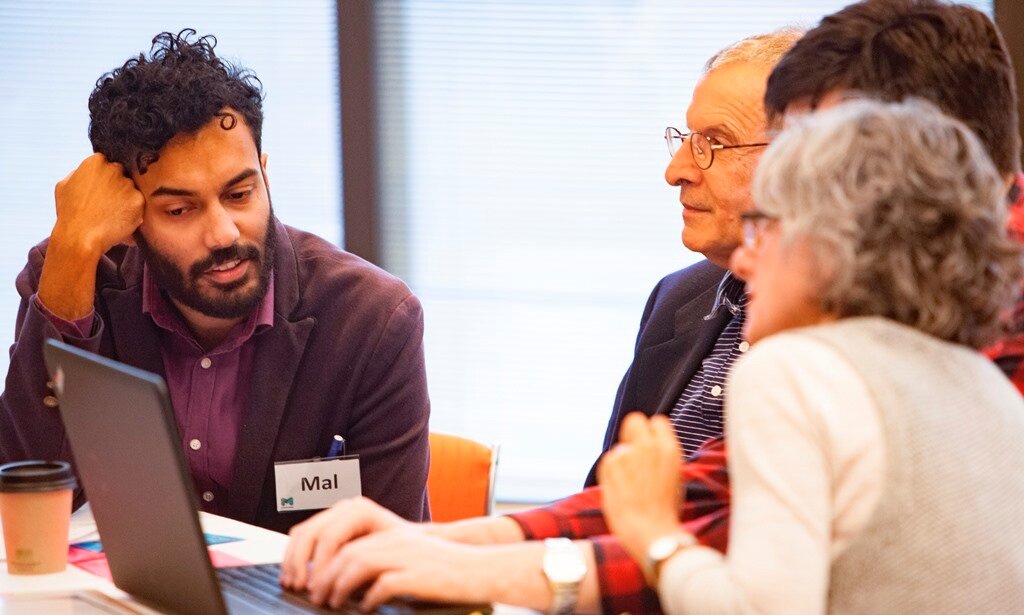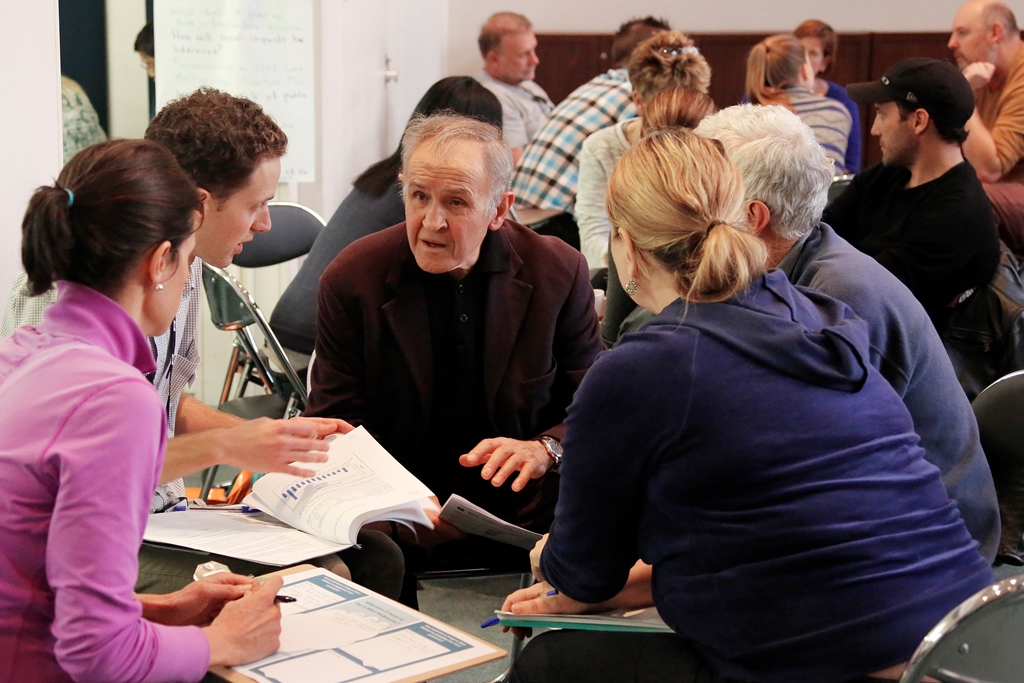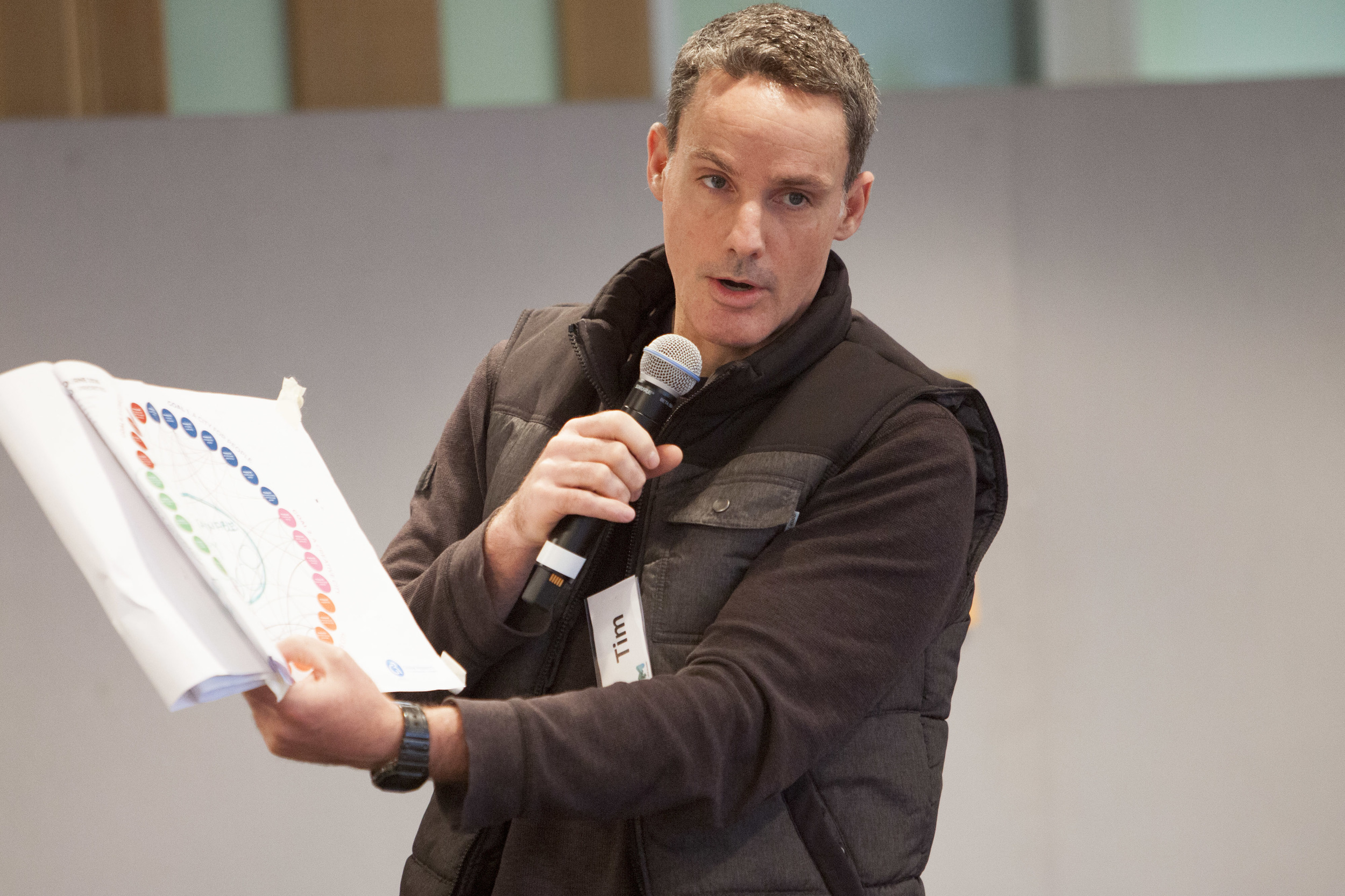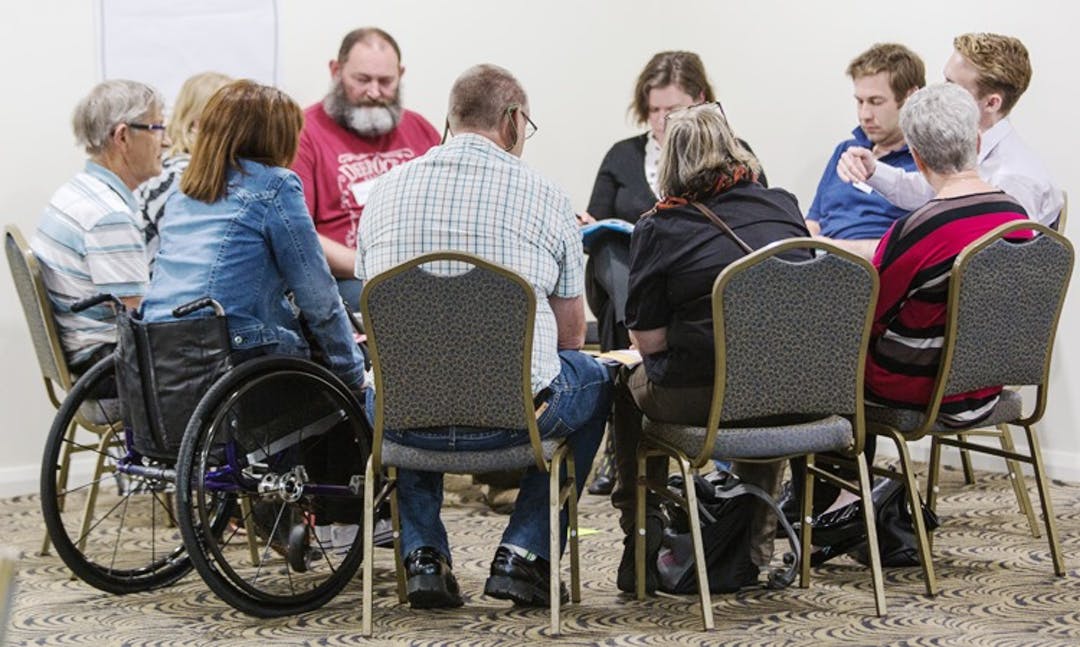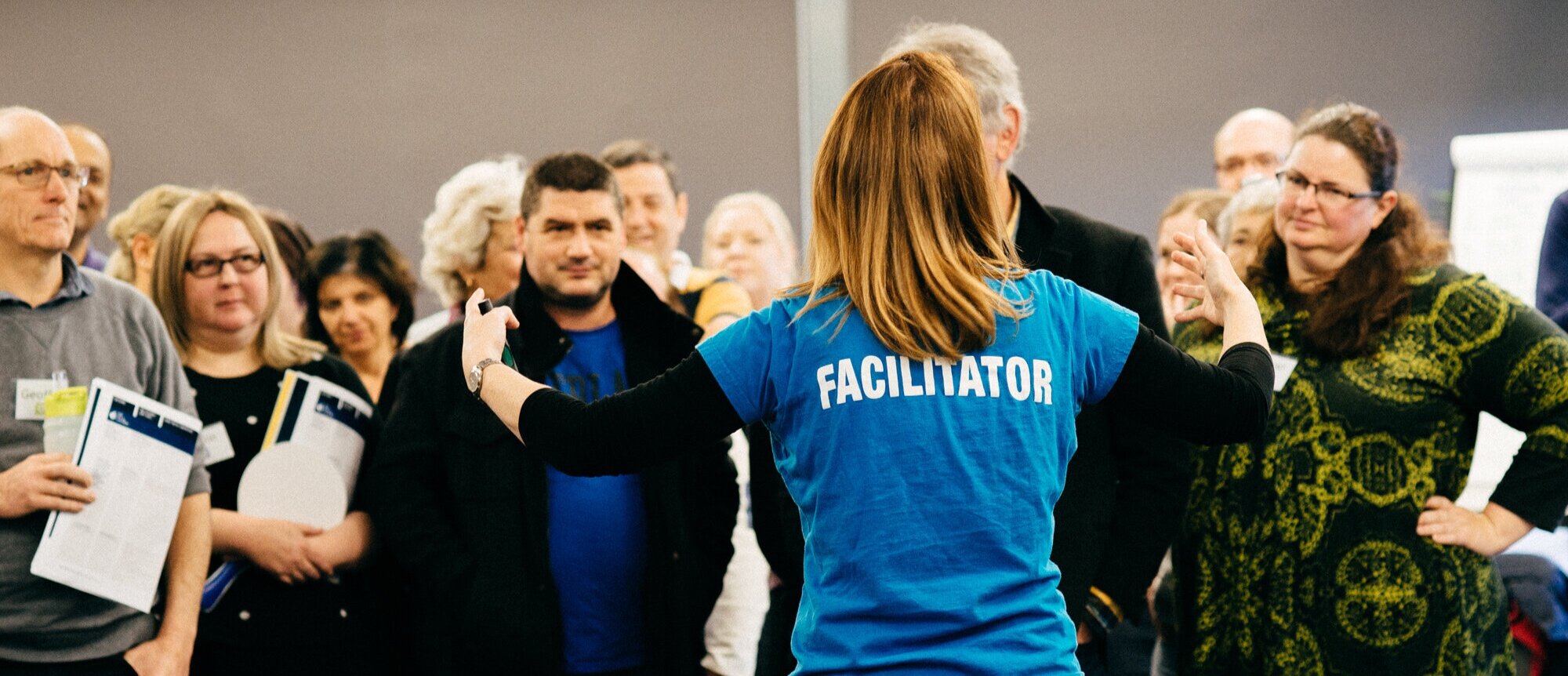what is DELIBERATIVE DEMOCRACY?
deliberation
| noun | de·lib·er·a·tion |
1. A long and careful consideration or discussion.
In the context of deliberative democracy, deliberation involves a group of people (1) considering relevant facts from multiple points of view, talking with others to think critically about options and enlarging perspectives, opinions and understandings.
{1} A random and representative sample of participants is necessary to achieve integrity with the process.
VIDEO: Part 1 in a three part series on deliberative engagement. What is it? And how does it differ from other kinds of engagement?
“Democracy is not elections, even though every manual on the subject tells us otherwise.
Campaigning and electioneering now are so synonymous with democracy, we can’t imagine anything else.
We’ve lost sight of how democracy was originally conceived.”
WHAT DELIBERATIVE DEMOCRACY MEANS
Deliberative democracy or deliberative engagement is all about placing people (citizens, residents, affected individuals) closer to the affairs of government and decision makers.
This form of community engagement enables randomly selected, everday people to deliberate together before coming to agreement. The group has real influence over a decision that impacts the community (or wider group) they represent.
Deliberative democracy emphasises information processing (meaning/sense-making) as much as information exchange (communication of information). Ample time and facilitation support is provided to the group to allow them to critically test, weigh up and grapple with a a range of perspectives, inputs and evidence.
Deliberative democracy is an alternative approach to 'asking people what they think when they're not thinking', which elicits uninformed responses. Instead, deliberative approaches seek to elicit informed, quality, meaningful outputs.
HOW DD DIFFERS FROM REPRESENTATIVE OR PARTICIPATORY DEMOCRACY
Deliberative democracy is different from representative democracy, which is about polling and voting for elected officials. Deliberative democracy ensures those impacted by an issue are enabled to influence over the outcome.
It also differs from participatory democracy, which is usually about breadth - involving lots of people in a wider variety of ways. Deliberative democracy involves a smaller, descriptively representative group of people considering an issue in more depth. The group often considers data and inputs collated via wider community engagement activitie that allow everyone to participate.
Unlike other forms of democracy, deliberative democracy emphasises the importance of informed, thoughtful discussion and consensus-building among a diverse group of citizens in order to build better decisions.
PRINCIPLES OF DELIBERATIVE ENGAGEMENT
Deliberative processes are built around a number of key principles including:
The group responds to a clear remit - a plain English question that goes to the heart of the dilemma being shared.
Participants will have access to the information they need to have an in-depth conversation and information will be neutral, balanced and from a range of different sources.
The process is representative. Participants are selected randomly via a random, stratified selection process.
Participants are given the time they need to deliberate, which allows them to consider complex information, grapple with trade-offs and impacts and weigh up options and ideas
The deliberative group is given a high level of influence over outcomes or decisions.
The group starts with a ‘blank page’ report - detailing their own thinking and developing their recommendations ‘from scratch’.
For more information, download our our free pdf which details six key deliberative engagement principles. MosaicLab’s processes are built around 10 principles, which are explored in detail in our book Facilitating Deliberation: A Practical Guide.
“Citizens’ assemblies are a way to get hard jobs done. They have transformed the way that Irish people live their lives. They have successfully contributed to the delivery of marriage equality and abortion, plus many other areas such as political reform and climate change.
”
VIDEO: This video prepared by Yarra Valley Water as part of the 2017 Yarra Valley Water Citizens' Jury process features interviews with MosaicLab co-founder Nicole Hunter and newDemocracy Foundation Executive Director Iain Walker. It provides an explanation of what a citizens' jury is and the value of this approach.
FORMS OF DELIBERATIVE ENGAGEMENT
The principles of deliberation can be applied to a range of contexts and formats. Deliberative processes can include:
citizens’ juries
citizens’ assemblies
participatory budgeting (where deliberation is integrated into the process)
deliberative panels and forums (sometimes called community panels).
Deliberative principles and approaches can also be integrated into a range of other types of engagement activities.
Further reading on different types of deliberative processes can be found in the newDemocracy Foundation’s research note - forms of mini-publics.
why DELIBERATIVE DEMOCRACY IS WORTH IT
When conducted effectively, deliberative processes can lead to new solutions for the most challenging problems we face (sometimes known as 'wicked' problems), improve policy outcomes and engender trust between citizens and government.
These processes draw on collective intelligence and result in decisions that are not only better, but are better supported by the wider public. The community is more likely to trust a decision influenced by ‘people like them’ than one made solely by an organisation or the government. They build shared responsibility, meaning that the outcomes of these processes are more likely to 'stick'.
These processes also less adversarial than most non-deliberative engagement approaches, and can take the politics out of the issue. This is influenced by a number of factors, including:
random selection - representative group of everyday people (rather than a a group comprising those with the biggest stake in the issue)
exposure to a diverse range of views, perspectives and alternate ideas,
enough time and information so people can provide considered input (not a reactionary/immediate response),
professional facilitators who support the group to identify their own biases, employ critical thinking skills, interrogate evidence and come to agreement.
Deliberative democracy can result in number of, ongoing and often transformative benefits that include:
increasing participants’ levels of knowledge about issues (more broadly), resulting in more informed, considered views being shared,
cultivating trust between authorities and communities,
building civic capacity and capability,
increasing general levels of civic engagement and political participation.
“It’s a cliche that there are no magic bullets. But all the evidence suggests that involving ordinary citizens in democratic deliberation ... can help us do democracy so much better.”
ARE YOU DELIBERATION READY?
Take the MosaicLab deliberation assessment test: Start now
WANT TO GET READY?
MosaicLab offers several deliberation training options. Our training sessions have been designed to suit individuals or larger groups, and will leave you or your staff ready to prepare, plan and manage a deliberative engagement process. Visit our online learning platform to explore our training options.
CASE STUDIES
The MosaicLab team specialises in facilitating deliberative processes. Some of our past projects include:
Baw Baw Shire Council Community Panel (learn more)
Yarra Valley Water Citizens' Jury (learn more)
Barwon Water Community Panel (learn more)
City of Melbourne Ten Year Financial Plan (learn more)
Geelong Citizens' Jury (learn more)
VicHealth Citizen's Jury on Obesity (learn more)
Future Melbourne 2026 Citizens' Jury (learn more)
Take a look at our case studies for further examples of deliberative engagement processes, plus examples of community engagement projects that included some deliberative elements.
FREE RESOURCES & FURTHER INFORMATION
Our free resources section contains a number of useful, free deliberative engagement resources including videos and free resource downloads for those considering or about to embark on a deliberative journey. You can also download a copy of our new Deliberation Dictionary which features a list of commonly used terms in this field.
We often tackle myths, misconceptions and questions around deliberative engagement in our ‘Monthly Myth’ series, including:
the role of decision makers in a deliberative engagement process,
the ability of everyday people to tackle complex problems,
why deliberation isn’t always the answer (and when it is),
how stakeholders can be involved in deliberative processes
We also regularly publish ‘Deliberation Disaster’ posts highlighting the big things that can go wrong when planning and delivering deliberative engagement and how to avoid these big pitfalls.
In 2017, a panel of experienced deliberative engagement practitioners, researchers and project managers conducted a panel Q&A session for the IPAA Public Sector Week 2017 event. A summary of these insightful questions and answers can be found here.
The newDemocracy Foundation (nDF) is an independent research organisation that works with governments to design and operate public engagement projects that enable everyday people to contribute to reaching shared and trusted recommendations around challenging areas of public policy. The nDF website contains a large selection of interesting and helpful resources and research papers, including this research note on how deliberation differs from usual political discussion.
We’ve also published an informative article explores how random, stratified selection processes work and what is meant by ‘descriptively representative’ in this blog post.
Additionally, the Real Democracy Now podcast is full of interesting episodes talking about deliberative engagement or ‘mini publics’.
Our book, Facilitating Deliberation: A Practical Guide is an all-access pass to the specialised world of facilitating deliberations, with sections for decision-makers, project managers, facilitators and anyone interested in deliberative democracy more broadly.


